Renowned Korean filmmaker Hong Sang-soo’s delicate and thought-provoking new movie, In Our Day, weaves together the stories of two Seoul-based artists. Released in 2022, the film stars Hong’s longtime collaborator Kim Min-hee as well as veteran actor Ki Joo-bong. Through their engaging performances and Hong’s signature subtle yet resonant style, In Our Day invites reflection on life, work, and creativity at different stages.
The movie presents two parallel tales, alternating between poet Hong Ui-ju and actress Sang-won. Ui-ju, played brilliantly by Ki, has found unexpected popularity late in his career and ponders his art and legacy. Sang-won, embodied vividly by Kim, has walked away from acting and stays with a friend, mulling her next steps. Though the characters never meet, their worlds overlap in intriguing ways that Hong explores with finesse through economical yet poignant scenes.
Shot on digital with Hong’s trademark restrained technique, In Our Day possesses a calm, graceful charm. Between the lines of casual chats unfold universal questions about identity, purpose, and finding fulfillment. While some may find Hong’s method spare, his insightful vision shines through in this luminous portrayal of creative spirits contemplating life’s mysteries. For those open to its subtle wisdom, In Our Day offers a serene, memorable look at humanity’s shared experiences through one director’s singular lens.
Interpreting Connections
At first glance, Hong Sang-soo’s In Our Day presents an unconventional narrative structure through its alternating storylines that never directly intersect. However, a closer examination reveals intriguing ambiguities and opportunities for interpretation.
The film splits its gaze between two seemingly unrelated tales. We follow an aging poet, Ui-ju, and an actress named Sang-won on what appears to be the same day. Ui-ju welcomes visits from students, while Sang-won stays with a friend, mulling her career path.
Despite purely episodic glimpses into these characters’ circumstancesHong prompts us to consider deeper linkages. He introduces each vignette with title cards detailing not just externals but introspections unseen. Sang-won privately relies on herself despite outward dependence, while Ui-ju silently wishes for quietude despite plaudits.
While neither story presents a linear plot, they explore parallel domains of creativity and experience. Ui-ju imparts wisdom gained over a career, while Sang-won reflects on what led her to leave acting. Intriguing parallels also emerge, like a shared ramyeon preparation hinting at overlaps in taste, if not biography.
Most fascinating are the gaps Hong leaves for our interpretation. Characters reference unnamed influences from the past yet disclose little. Are Sang-won and Ui-ju as acquainted as their small similarities and the film’s title possibly suggest? Hong doesn’t provide answers, instead letting imagination fill lexical spaces.
This open-ended structure appropriately captures the ambiguity of human experiences and connections. While interactions are brief snapshots, Hong trusts our intuition to perceive deeper interplay between character contemplations that are separated yet resonant in thought. Like life itself, In Our Day resists neat resolutions yet evokes profound insight into creative spirits through one day’s delicate impressions. Hong spins a rich tapestry from silken strings of narrative ambiguity.
Bare Bones Beauty
When watching a Hong Sang-soo film, viewers come to expect a very particular style of filmmaking. From the first frame, it’s clear that In Our Day is no different in this regard.
Hong employs long, unbroken takes using static digital cameras to capture real-time conversations. Scenes unfold in a fly-on-the-wall style, like witnessing everyday moments unnoticed. We follow characters as they chat over meals in sparsely decorated rooms.
This stripped-down look could come across as amateurish, but instead it immerses you in the intimate spaces. It adds naturalism to performances as actors improvise dialogue freely. You feel more like a participant than an observer in these scenes, hanging on to every syllable exchanged.
Complementing visuals are intertitles that introduce scenes and offer insight into characters’ inner thoughts. This lends the diaristic feel of privately glimpsed moments. At times, it seems we’ve stumbled upon secret musings not meant for outsiders.
While resembling a documentary, Hong’s direction retains fiction’s poetic imagination. The handheld intimacy provides access, but characters remain elusive. We’re left to interpret glimpses and connect what’s unseen through implication.
This lean attitude risks coming across as distancing to some. Scenes can outstay their welcome if patience wavers. But for those open to Hong’s rhythms, it cultivates richness through suggestion versus declaration.
In Our Day, Hong reaffirms his ability to extract profundity from life’s barebones facets. He transforms the use of space, dialogue, and intention within into a profound meditation on creativity and humanity’s beautiful everyday.
Exploring Life’s Deeper Themes
Hong Sang-soo’s In Our Day offers glimpses into existential questions through two separate but subtly connected stories. Kim Min-hee portrays an actress wrestling with identity, while Ki Joo-bong plays a poet pondering life’s purpose.
Min-hee’s character left her career, feeling trapped by others’ perceptions. She struggles to express her true self through contrived roles. This sheds light on how public views can confine us and how freeing it is to break from expectation.
Ki’s poet finds newfound fame late, but wonders what really matters. As an artist who is now reflecting, does success equate to fulfillment? His young guests probe similarly weighty topics, like integrity in a changing world.
Both grapple with the challenges of their stage in life. Min-hee’s in a flux transition while Ki questions what’s next in his later years. Hong explores our constant striving to find meaning and how this evolves alongside age and experience.
Scenes pulse with allusions to truth, honesty, and small daily joys. Whether musing alone or in company, characters uncover life’s deeper truths through casual exchange. Even in lighter moments, an undercurrent of philosophy flows.
Though separate stories, motifs resound between the two. Shared gestures, favorite foods, and a love of music subtly tie them together, inviting reflection on our interconnectedness beneath surface differences.
In Our Day presents no clear answers, instead opening dialogs on universal questions. With gentle intimacy, it taps into our humanity—doubts, epiphanies, and things too profound for words alone.
Glimmers of Truth Through Natural Performances
In Our Day stands out most for its two lead performances by frequent Hong Sang-soo collaborators, Kim Min-hee and Ki Joo-bong. As women question her artistic drive and a poet finds new appreciation, their naturalism imbues even the slightest dialogue with emotional resonance.
Kim Min-hee excels as a former actress, wrapping her mind around a career shift. Her Sang-won reflects with subtle regret and uncertainty, hinting at depths left unspoken. This grounded quality anchors the drama, giving weight to philosophical musings on identity and truth.
As the poet Hong Ui-ju, Ki Joo-bong brings both wisdom and weariness to his role. With gentle humor and insight, he captures an artist pondering life’s meaning in different stages. His natural charisma leaves an impression, despite the character’s few scenes.
Supporting performances complement them smoothly. Song Seon-mi lends empathy as Sang-won’s caring friend, while Park Miso shines as her passionate cousin and the poet’s curious documentary maker. Ha Seong-guk engages curiously as Ui-ju’s young guest.
Their easy rapport seems partly due to their experience with Hong Sang-soo’s signature style. Comfort in his methods likely helps probe deeper truths through casual talks. The professional relationships between actors and directors imbue their interactions with nuanced understanding.
Ultimately, In Our Day finds its soul not through complex plots but rather the glimmers of honesty between natural, relatable characters. It’s a testament to the transformative power of raw, immersed performances.
Reflections on Life’s Intangibles
In Our Day presents two seemingly disjointed storylines without firmly connecting them. This structure invites the interpretation of ambiguous relationships between the characters. Sang-won, the actress, and Ui-ju, the poet, each find themselves pondering life’s meaning in different stages.
Their narratives occasionally echo through minor overlaps, like preferences for spicy ramen. But direct interactions are absent, leaving room for speculation. Given director Hong Sang-soo’s history with star Kim Min-hee, some view their characters as veiled extensions of the artists themselves.
Ui-ju and Sang-won’s introspections also hint at broader symbolism. She grapples with losing touch with her art, while he imparts wisdom on gratitude and honesty. Beyond the surface drama, their musings reflect on integrity, aging, and finding fulfillment.
Subtle and loosely defined, In Our Day prioritizes thought-provoking suggestions over straightforward storytelling. Natural performances anchored by Kim and Ki breathe depth into spare dialogue. Stylistically pared-down yet richly atmospheric, it rewards thoughtful viewing.
Within Hong’s esteemed filmography, In Our Day achieves a meditative tone, highlighting life’s intangible aspects. It invites us to analyze not just characters and plots but also our own relationships and search for meaning. Though lighter than some other works, its restrained charms still linger in reflection.
Reflections on Craft and Endurance
In Our Day fits comfortably within Hong Sang-soo’s formidable filmography while standing independently on its own aesthetic merits. Fans will find familiar pleasures in his signature minimalist approach and reflective tone. New viewers, meanwhile, face the challenge of fully appreciating such sparse, elliptical storytelling without background context.
At its core, the film remains a quiet character study. Sang-won and Ui-ju’s lives intersect subtly through shared imagery rather than direct interaction. But their introspective conversations offer resonating insight on creativity, purpose, and life’s fleeting nature. Viewers must look below surface realities to find deeper symbolic meaning.
Technically, Hong strips down his method to its barest form. Without ulterior artifice like elaborate mise-en-scène, editing tricks, or flashy visuals, he trusts audiences to engage fully with lived-in performance and natural dialogue. Some may see this as sparse; for others, it cultivates mindfulness.
After such a lengthy and prolific career, it’s remarkable that Hong continues to innovate within self-imposed limitations. While In Our Day may not break new narrative ground, it demonstrates how his vital artistic spirit endures. Revisiting familiar themes with sincerity still yields novel shades of insight and beauty.
Hong Sang-soo has crafted a remarkable body defined by discipline, humility, and subtle mastery. In Our Day, he proudly continues his exploration of life’s intimate yet profound moments. Admirers will find fresh rewards, and open-minded new viewers just might gain a lifelong appreciation of his singular cinematic lens. Either way, there’s comfort in knowing this enduring artist’s reflections aren’t ending anytime soon.
The Review
In Our Day
In Our Day is a quiet contemplation that rewards patience and introspection. Hong Sang-soo once again strips cinema to its barest essentials, crafting a minimalist character study that prioritizes atmosphere and suggestion over narrative structure. While some may find its elliptical nature obtuse, the film cultivates an understated poetry in its intertwining of lived-in performances and everyday imagery. Admirers of Hong Kong will find familiar pleasures of reflection, though newcomers face a challenge in fully appreciating its sparseness without context. Overall, In Our Day proves the director remains a vital artist, demonstrating through subtlety and simplicity that he continues evolving within self-imposed limits.
PROS
- Understated performances from Hong Sang-soo's talented repertory players
- Atmospheric cinematography and naturalistic dialogue
- A thought-provoking examination of themes like creativity, purpose, and life's fleeting nature
- Yields rewards for patient viewers open to minimalist and elliptical storytelling
CONS
- Sparse and ambiguous narratives may frustrate those wanting a clearer plot
- Lacks the context needed to fully appreciate subtleties for newcomers to Hong's oeuvre
- A slow pace and minimal story development won't captivate all audiences









































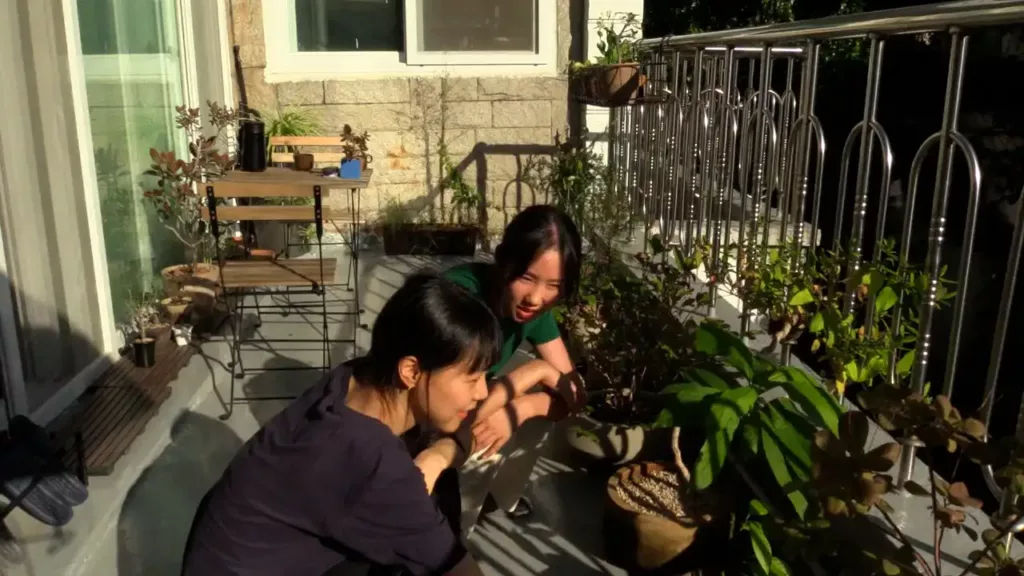
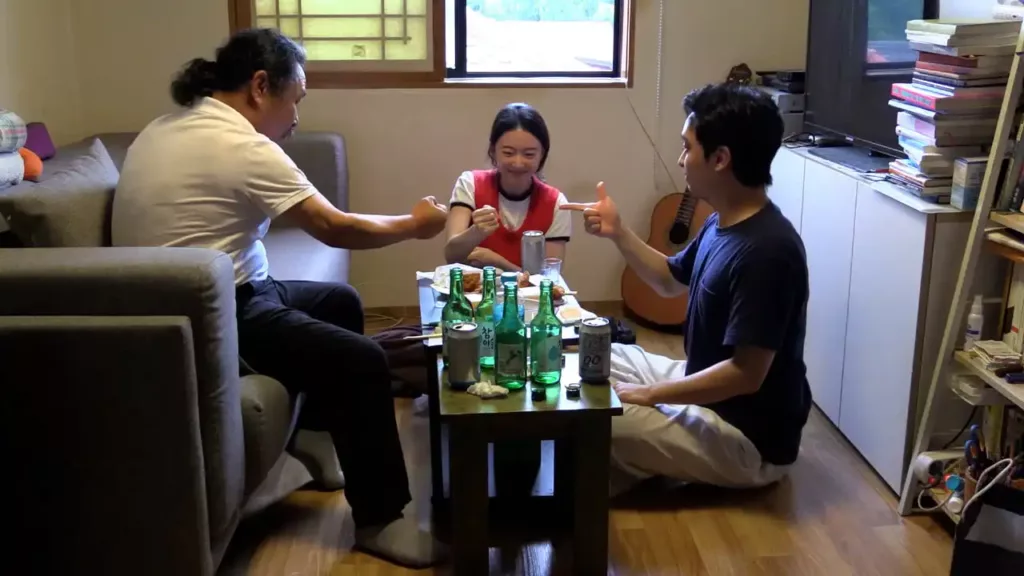
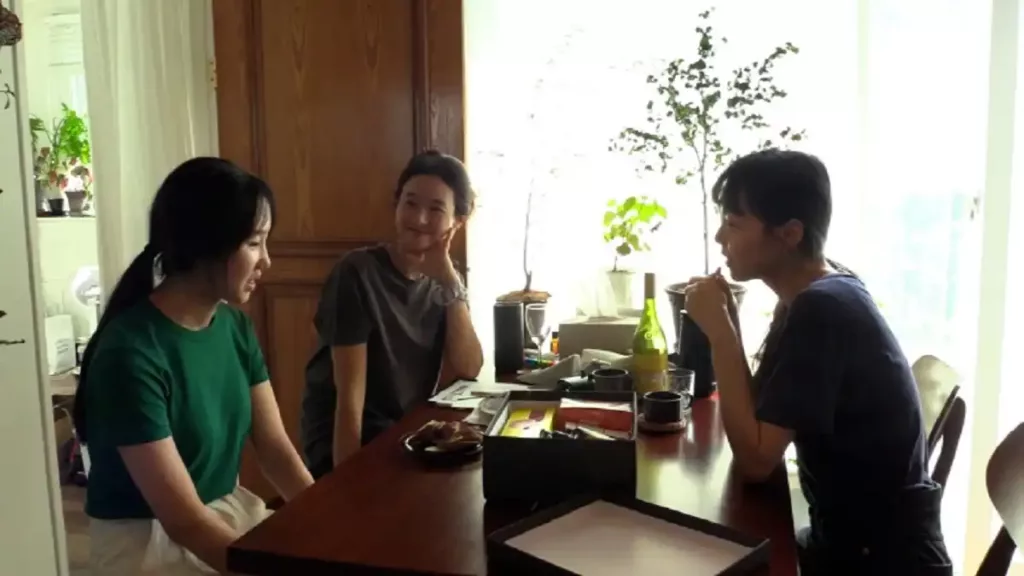
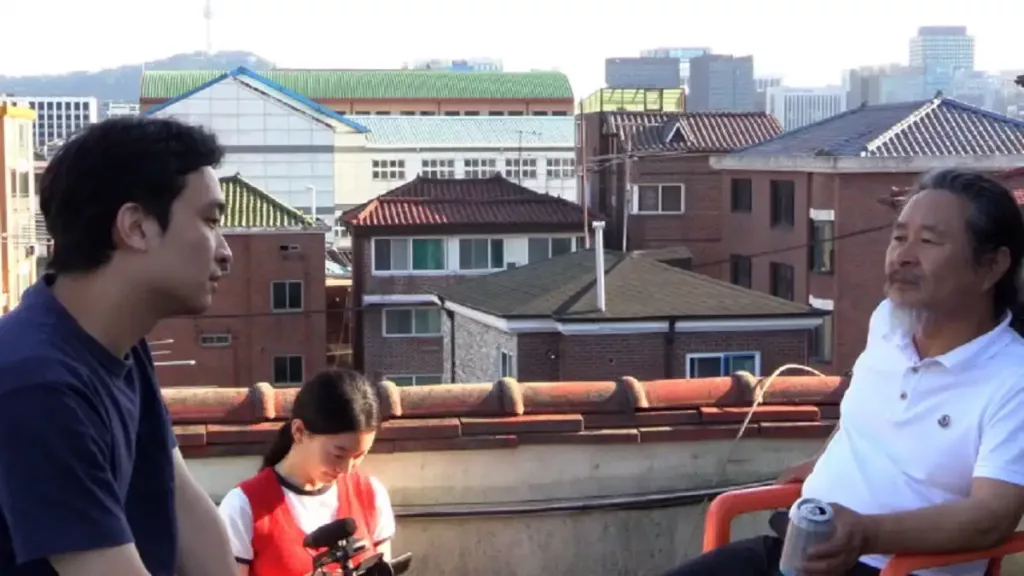
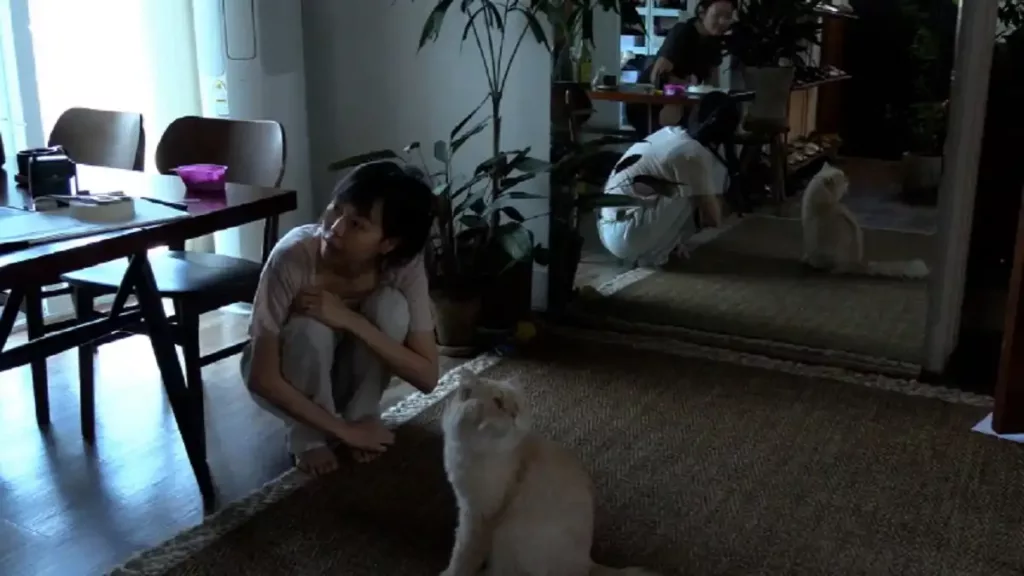








Discussion about this post